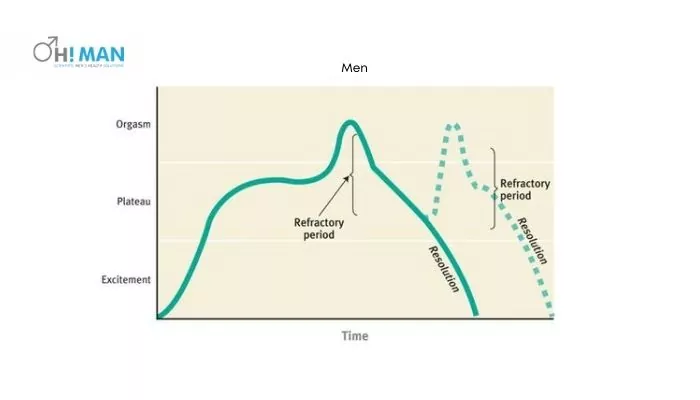What is Refractory Period in Men & Women? How to Shorten it
What is Refractory Period in Men & Women? How to Shorten it

The refractory period refers to the phase after orgasm throughout which an individual is sexually inactive. The refractory period may have psychological as well as physiological effects.
It’s often physically challenging to get the second time arousal immediately for person with longer refractory period. Further, it’s possible not to feel like having a sex session in minutes to a few hours. It is because of the refractory period. So, you’re not psychologically or physically engaged in sexual activities.
It is normal not to have the most sexual thoughts in the refractory phase. If your partner tries to stimulate you sexually, you’re likely not to notice any physical reaction to your body.
Usually, the female and male refractory period have four phases, including:
- Desire
- Arousal
- Orgasm
- Resolution
The length of your refractory time will vary based on various variables, including age and medical condition. Let’s understand the refractory period, factors shortening the timeframe, and how you can improve it.
Table of Content –
- What Is the Refractory Period?
- Normal Female & Male Refractory Period
- Does Refractory Period Vary Between Masturbation & Sex?
- When does the Refractory Period become an issue?
- Reasons to meet with a sexologist
- Factors Affecting Refractory Period
- Treatment For Improving Female & Male Refractory Period
- Erectile Dysfunction (ED) Medications
- Other Techniques for Reducing Your Refractory Period
- Bottom-Line
What Is the Refractory Period?
The refractory phase is the duration that begins when you have an orgasm and ejaculate following sexual activity or masturbation.
When you’re in a state of masturbation or sex, you’ll typically have sexually charged thoughts. You’ll be energized, enthralled, and ” in the state of mind.” From a physical standpoint, it’s normal to be in an erection when you’re engaged in sexual activities.
After ejaculating and orgasming, your penis gets flaccid, and your sex attraction can vary from intense to nonexistent.
You will not be enthralled or be thinking about sexual activities.
The refractory phase is often described as the “resolution” stage of the human body’s response to the sexual stimulation cycle. The cycle is comprised of 4 phases:
- Desire: Your pulse rate rises and blood supply to your genitalia increases during the first phase of the cycle. This phase lasts from a few minutes and many hours.
- The Arousal. Muscle tension will grow, blood circulation to your genitals will elevate, and your heart rate, blood pressure, and breathing rate, will all increase during this period. This phase begins following the desire phase and lasts until you’re ready to go through orgasm.
- Orgasm. The pleasure you feel from sexual stimulation will increase your heart rate, your blood pressure will rise to its maximum, and you’ll experience orgasm from the sexual stimulation.
- Resolution. This is the refractory phase. The body gradually returns to normal functioning. The heart rate will drop, your penis will turn flaccid, and you’ll be at the same time tired and satisfied.

Normal Female & Male Refractory Period
The length of the refractory interval can differ in length for different men. Young men may have a short refractory period in comparison of older men that will last only a few minutes in this period. However,
- The typical women and male refractory time frames are different from person to. It’s a function of general health, libido levels, and diet.
- The normal refractory time for young men can range between 5 sec and 15 minutes.
- The typical refractory duration for men over 50 can range from 2 to 24 hours.
- Women’s refractory periods that women experience could last for only some seconds and could go unnoticed.
Moreover, the refractory phase also relies on the state of mind. Further, it also depends on the thoughts you’re making. Another factor that affects the refractory times are:
- What do you feel about the other person?
- How interested are you in having sexual pleasure?
- Are you currently smoking cigarettes or drinking in large quantities?
- Have you been circumcised?
- Are you taking any medicine?
- How much stress are you experiencing?
Does Refractory Period Vary Between Masturbation & Sex?
Yes, it varies.
One research examined three studies of females and males engaged in penile-vaginal interaction (PVI) for orgasm.
The study found that prolactin is an important hormone during the refractory phase levels are 400 percent higher following PVI than the following masturbation.
This means that your refractory period could persist longer after having a sexual encounter with a companion than following individual masturbation.
Numerous hormones produced during and after climaxing, including oxytocin, prolactin, and some others, contribute to the refractory period’s reduction of stimulation and the prevention of erection.
Surprisingly, these hormones produce more significantly after sexual activity than following masturbation. So, that can be the main reason behind this difference in refractory time and you should avoid doing extrema masturbation habit to save yourself from associated side effects of masturbation
When does the Refractory Period become an issue?
Refractory periods can have physical and mental impacts. During the refractory period, one may experience a loss of sexual drive or an inability to have intercourse.
For many, this resolution time allows time to unwind and cuddle with friends or even fall asleep. This time of refractory is the best time to recharge. However, if the refractory time is prolonged or you face an unavoidable refractory phase, it’s time to speak to a sex therapist.
Reasons to meet with a sexologist
- When the length of your refractory duration isn’t in line with your partner’s requirements and is negatively impacting your relationship
- Women crave sexual pleasure regularly.
- If the men cannot get an erection in response to a sexual stimulation
- Men who suffer from retrograde ejaculation
Factors Affecting Refractory Period
The factors affecting the refractory time include:
- Libido and Arousal Level. Suppose you experience a high sexual libido or are experiencing increased excitement during a specific sexual experience. In that case, you might feel a shorter period of refractory which allows you to experience a more rapid orgasm following an earlier orgasm.
- Sexual functions. Healthy sexual function can aid in overcoming your refractoriness faster. However, suppose you have issues with your sexuality (like erectile dysfunction or creating lubrication). In that case, you’re more likely to experience difficulty in orgasming shortly after an earlier climax, and your body might need to rest for a while before becoming excited again.
- Health in general. People who are healthy and eat healthy and balanced meals and exercise regularly have a higher chance to experience less frequent refractory episodes than those who consume unhealthy foods or don’t exercise frequently.
- Age. After 40, many individuals experience changes in their sexual libido, hormone levels, and sexual activity that may extend their refractory periods.
- Genitalia. A common rule is that the male refractory time is longer than the female refractory time. Moreover, the typical range for males can be anywhere from a few seconds to two hours prior they can exhale again. For women, it’s anywhere between just a few seconds to just a few minutes until they reach a new high.
- Sexual experience type: Studies have shown that the kind of sexual encounter one engages in may determine the length of their recovery. For instance, men engaging in masturbation may have a shorter refractory period. At the same time, men engaging in penile-vagina sex may have a longer refractory period. Same goes to a men who are experience in sex and men who is having first time sex.

Treatment For Improving Female & Male Refractory Period
Suppose you look online for suggestions on how to shorten your refractory period and also recuperate faster after sexual activity. There’s a good chance you’ll discover myriad different theories and products that promise remarkable results.
Moreover, a lot of them are based on rumors than actual research. While they might be beneficial for some but there’s no guarantee they’ll prove effective for you.
In reality, since we aren’t aware of the exact reason why the process of refractory occurs, there aren’t many methods that have been proven to reduce your refractory interval. After that, you can get ready for sexual sex quicker after your first gasp.
Erectile Dysfunction (ED) Medications
In addition, there’s some evidence-based research that indicates erectile dysfunction (ED) medication like sildenafil (the active ingredient in Viagra) and the active ingredient is Tadalafil (Cialis), as well as others, may reduce the duration of male refractory.
Sildenafil, Tadalafil, and many other ED medicines require a prescription from a physician.
Ohman offers a variety of ED and PE medications after a consultation online with a doctor who will decide the appropriateness of a prescription.
Other Techniques for Reducing Your Refractory Period
In addition to taking erectile dysfunction drugs such as sildenafil or Tadalafil, implementing some other adjustments to your lifestyle and habits can help you reduce your refractory cycle and improve your sexual performance.
- Do your best to exercise and eat well: Although there’s very limited research on fitness and the refractory phase specifically, being active and keeping a healthy weight can make a huge difference to your sexual health in general.
- Take care of your heart health: Erections are all about blood flow across your body. Focusing on your cardiovascular health could aid if you’re finding it difficult to recover from a hard sexual activity (particularly if you’re inclined to ED after the first time). Moreover, things like eating heart-healthy food or avoiding smoking, as well as cutting down on salt intake, can significantly influence the sexual quality of your partner.
- Limit your alcohol consumption: Alcohol leads to various types of sexual dysfunction, which include erectile dysfunction as well as lower sexual desire.
- Test new sex postures, fantasies, and foreplays: Optimal sexual performance involves stimulation and the desire to arouse. When you’ve completed the first round, experiment with new ways of foreplay and sexual postures that get you feeling aroused and excited to go.
Bottom Line
It’s normal to become bored of sexual activity and struggle to get an erection immediately after you have ejaculated and orgasmed.
The length of time a refractory will last differs from one person to another, which means that it can take anything between a couple of minutes to several hours to heal after sexual activity. When you’re 40 or 50s, or even older, it could take more than one day to engage yourself in sex again.
Worried about your refractory periods? Then, consult the specialists at Ohman. We can offer the correct supplements and other medications that can boost your hormone levels to normal and improve your refractory period.
Book online consultations for confidential and safe discussions with our expert doctors across India.



